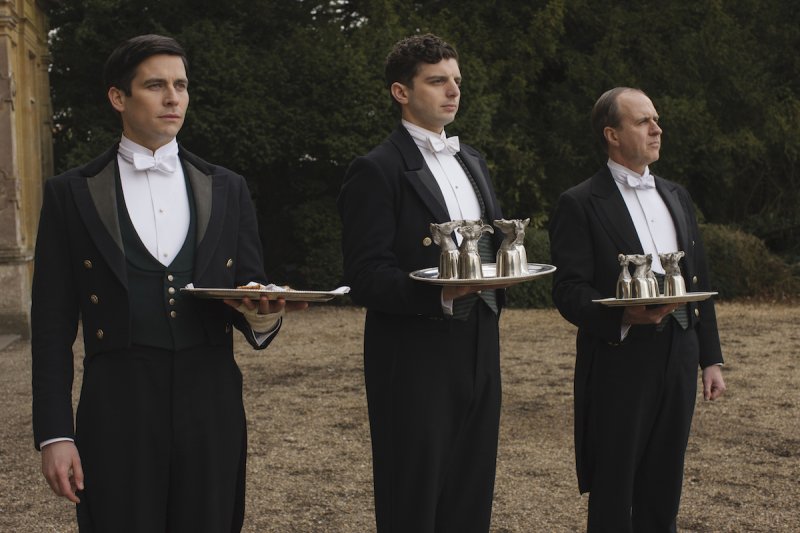
Monday
I attended Downton Abbey with my mother and wife yesterday, and while I’m not the fan of the series that they are, I enjoyed it. One plot development reminded me of a scene from Oliver Goldsmith’s She Stoops to Conquer.
Recounting it requires me to reveal a spoiler but it’s very minor. Peeved when they are shoved aside by the king and queen’s staff during a royal visit, Downton Abbey’s servants find a way to regain their positions at the table. They are given strict instructions on how to behave, and I won’t ruin any more of the film by revealing how well they perform.
Downton Abbey regulars will tell you it would be impossible for Downton’s servants to perform as badly as the servants do—or threaten to—in Goldsmith’s comedy. My favorite moment occurs when Diggory asks Hardcastle not to repeat a favorite joke lest he burst out laughing. The occasion is a dinner to honor young Marlowe, who is coming to woo Hardcastle’s daughter:
HARDCASTLE. Well, I hope you are perfect in the table exercise I have been teaching you these three days. You all know your posts and your places, and can show that you have been used to good company, without ever stirring from home.
OMNES. Ay, ay.
HARDCASTLE. When company comes you are not to pop out and stare, and then run in again, like frightened rabbits in a warren.
OMNES. No, no.
HARDCASTLE. You, Diggory, whom I have taken from the barn, are to make a show at the side-table; and you, Roger, whom I have advanced from the plough, are to place yourself behind my chair. But you’re not to stand so, with your hands in your pockets. Take your hands from your pockets, Roger; and from your head, you blockhead you. See how Diggory carries his hands. They’re a little too stiff, indeed, but that’s no great matter.
DIGGORY. Ay, mind how I hold them. I learned to hold my hands this way when I was upon drill for the militia. And so being upon drill——
HARDCASTLE. You must not be so talkative, Diggory. You must be all attention to the guests. You must hear us talk, and not think of talking; you must see us drink, and not think of drinking; you must see us eat, and not think of eating.
DIGGORY. By the laws, your worship, that’s parfectly unpossible. Whenever Diggory sees yeating going forward, ecod, he’s always wishing for a mouthful himself.
HARDCASTLE. Blockhead! Is not a belly-full in the kitchen as good as a belly-full in the parlour? Stay your stomach with that reflection.
DIGGORY. Ecod, I thank your worship, I’ll make a shift to stay my stomach with a slice of cold beef in the pantry.
HARDCASTLE. Diggory, you are too talkative.—Then, if I happen to say a good thing, or tell a good story at table, you must not all burst out a-laughing, as if you made part of the company.
DIGGORY. Then ecod your worship must not tell the story of Ould Grouse in the gun-room: I can’t help laughing at that—he! he! he!—for the soul of me. We have laughed at that these twenty years—ha! ha! ha!
HARDCASTLE. Ha! ha! ha! The story is a good one. Well, honest Diggory, you may laugh at that—but still remember to be attentive. Suppose one of the company should call for a glass of wine, how will you behave? A glass of wine, sir, if you please (to DIGGORY).—Eh, why don’t you move?
DIGGORY. Ecod, your worship, I never have courage till I see the eatables and drinkables brought upo’ the table, and then I’m as bauld as a lion.
HARDCASTLE. What, will nobody move?
FIRST SERVANT. I’m not to leave this pleace.
SECOND SERVANT. I’m sure it’s no pleace of mine.
THIRD SERVANT. Nor mine, for sartain.
DIGGORY. Wauns, and I’m sure it canna be mine.
HARDCASTLE. You numskulls! and so while, like your betters, you are quarrelling for places, the guests must be starved. O you dunces! I find I must begin all over again——But don’t I hear a coach drive into the yard? To your posts, you blockheads. I’ll go in the meantime and give my old friend’s son a hearty reception at the gate. [Exit HARDCASTLE.]
DIGGORY. By the elevens, my pleace is gone quite out of my head.
ROGER. I know that my pleace is to be everywhere.
FIRST SERVANT. Where the devil is mine?
SECOND SERVANT. My pleace is to be nowhere at all; and so I’ze go about my business.
[Exeunt Servants, running about as if frightened, different ways.]
In only one way does this scene anticipate what occurs in Downton Abbey. You must watch the film to find it out.

